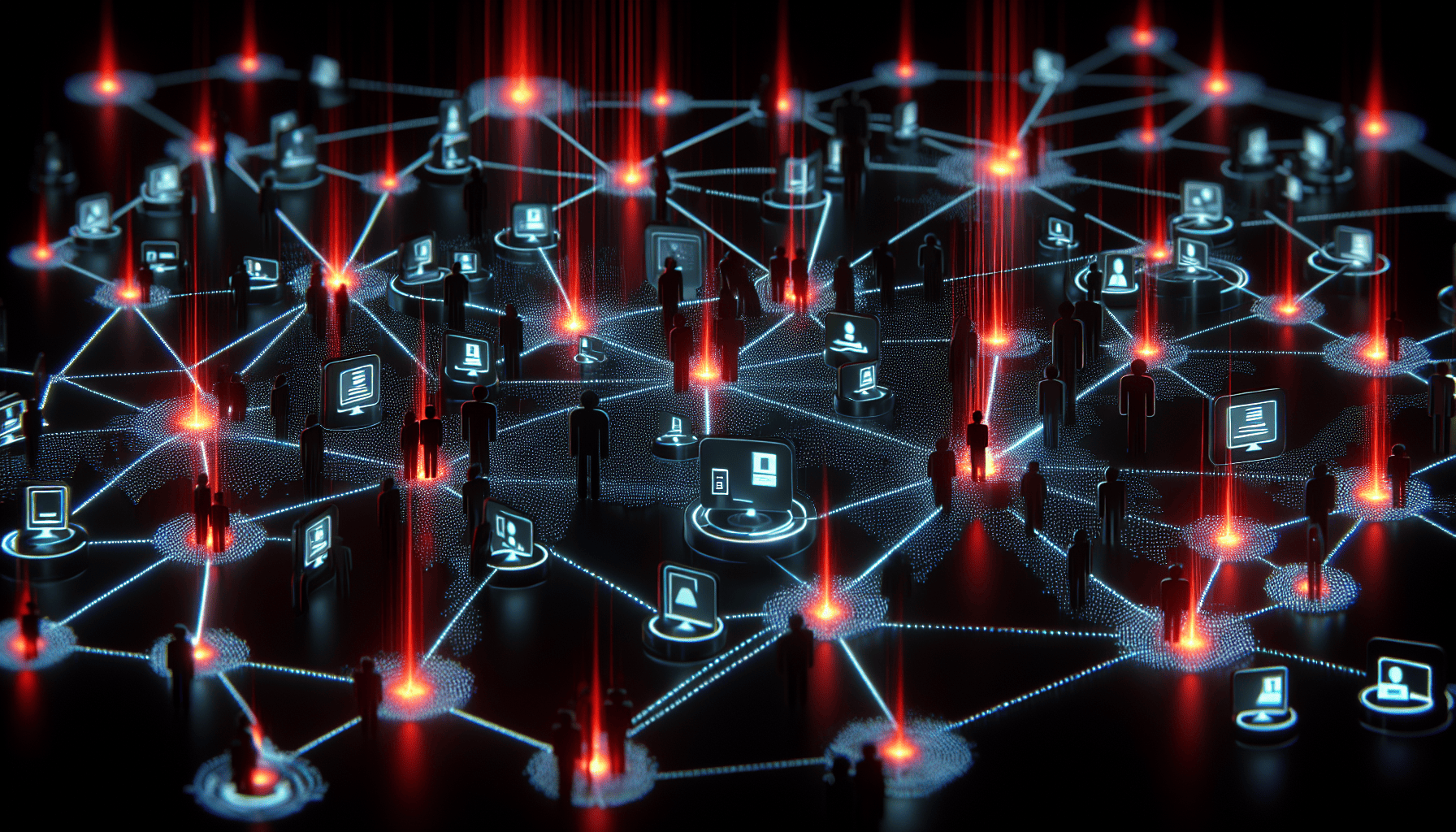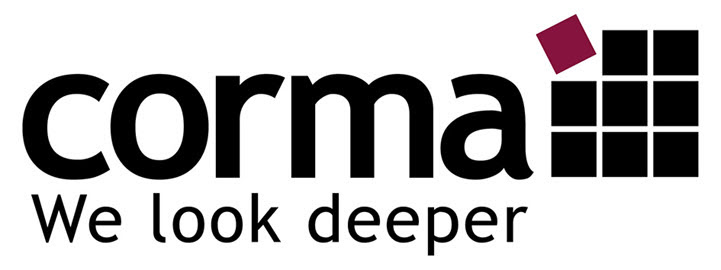Discovering your personal information on the dark web can be alarming. Our guide provides immediate steps for a dark web search for personal information, equipping you with the tools to check for data exposure and protect yourself. Find out if you’re at risk and what you can do today.
Key Takeaways
Personal data can end up on the dark web due to breaches and leaks, where it is sold by cybercriminals, putting individuals at risk of identity theft and fraud.
Dark web scans help identify personal information exposure, with services like Experian offering free scans, while firms like Corma Investigations provide continuous monitoring and digital footprint assessments for enhanced security.
Securing online accounts with strong, unique passwords and enabling two-factor authentication, as well as regular credit report monitoring and legal reporting in case of identity theft, are vital steps in protecting against dark web dangers.
Understanding the Dark Web and Personal Data Exposure

The internet, much like an iceberg, has three layers:
The surface web, the part most of us are familiar with, is visible and indexed by search engines.
The deep web, a vast realm of content requiring authorization to access, such as online banking or email accounts.
The dark web, the deepest, most secretive layer, only accessible via specific tools, and often associated with activities requiring anonymity.
Now, you might be wondering, “How does my personally identifiable information end up in this shadowy corner of the internet?” Data breaches are a common culprit, where cybercriminals hack into databases and snatch sensitive information such as email addresses, passwords, and phone numbers, which are then sold on the dark web. Moreover, hackers can also access your personal information through compromised online accounts, leaks, and malware-infected devices. Needless to say, the exposure of such personal details poses serious risks of identity theft and fraud.
Yet, the dark web isn’t solely a cause for concern. It also serves as a powerful tool for:
uncovering the extent of personal data exposure
conducting research on cybercrime and illegal activities
monitoring and tracking down criminals
identifying vulnerabilities in online systems and networks
testing the security of your own website or network
A free dark web scan can help you check if your personal details are up for sale, allowing you to take necessary action before any damage is done.
Initiating a Dark Web Scan: The First Step to Safety

Running a dark web scan is much like sending a scout into enemy territory. It helps identify if your personal information, such as your email, Social Security number, or bank account details, are at risk or have already been exposed. This can be done through services like Experian, which offer free dark web scans. These involve setting up an account, verifying your identity, and scanning various web pages for your personal details, all without needing your credit card information.
For those seeking an all-encompassing strategy, expert services are at your disposal. Corma Investigations, for instance, offers specialized dark web investigation services. These go beyond just a scan — they track and secure personal and business information, offering tailored scans, monitoring strategies, and proposals on request. This personalized service is like having your own digital bodyguard, vigilantly keeping watch over your personal information on the dark web.
Initiating a dark web scan marks your first significant stride towards safety. But remember, this is just the beginning. The dark web is a vast and ever-changing landscape, and to truly protect your personal information, you need continuous monitoring and vigilance.
Launch Your Defense Against the Dark Web THREATS
Embark on your first step toward digital security by initiating a dark web scan.
Uncover potential exposures with Corma Investigations’ comprehensive scanning and monitoring solutions, providing you with the insights and tools needed to protect your identity and personal information.
You can reach via phone at +4921633490080, via email at mail@corma.de, or through platforms such as LinkedIn and Twitter.
Monitoring Your Digital Footprint with Professional Services
To navigate the complexities of the digital landscape effectively, having a professional guide is invaluable. This is where Corma’s Digital Footprint Assessment service steps in. This service includes:
A deep dive into your digital visibility
Identification of hazard indicators across the digital space
Use of proprietary tools for in-depth investigation
Formulation of a tailored strategy to minimize personal information risks and potentially delete sensitive data
Corma Investigations distinguishes itself through its custom-tailored approach. The service targets individuals with a heightened need for security, such as VIPs and executives. It offers the following services:
Scanning leak databases and media reports
Ensuring the safety of digital assets against evolving threats on the dark web
Providing a personalized and discreet service experience
Handling sensitive issues such as cyberstalking or the unauthorized distribution of personal data
With Corma’s professional dark web monitoring services, you can keep track of your digital footprint and have an expert team ready to act at the first sign of trouble. It’s like having a team of digital detectives, tirelessly working to keep your online presence secure.
Securing Online Accounts Post-Exposure

What happens when the worst-case scenario unfolds, and your personal information ends up on the dark web? The first crucial step is to secure your online accounts. Prompt password changes following a data breach and crafting robust, unique passwords for various online accounts are absolutely vital. Think of it as changing the locks on your digital doors. It’s a simple measure, but it can make a world of difference.
Implementing two-factor authentication is another indispensable measure. This adds an additional layer of security, requiring a second form of identification, like a code sent to your phone, even if your password has been compromised. It’s akin to having a security guard check your ID before letting you into a building, adding another hurdle for any would-be intruders.
Finally, consider using a password manager. These tools assist in creating and managing strong, unique passwords for all your accounts, enhancing security against unauthorized access. They can:
Generate and store multifactor authentication codes
Allow users to set a strong master password
Monitor for compromised or weak passwords
Enable secure password sharing
In the digital realm, a password manager is like a secure vault, storing all your precious keys and codes and keeping them safe from prying eyes.
Credit Report Vigilance: A Shield Against Identity Theft
In the fight against identity theft, your credit report is a critical battleground. Regularly monitoring these reports can help you spot unauthorized charges, new accounts, and unexpected score changes, potential signs of identity theft. It’s like having a surveillance camera on your financial life, alerting you to any suspicious activity.
There are also services designed to keep a close watch on your credit reports from the three major credit bureaus. These credit monitoring services provide continuous surveillance, alerting users to changes such as new inquiries or accounts, which is crucial for detecting unauthorized activity. Some premium services even offer comprehensive protection including three-bureau monitoring, dark web scanning, and sometimes identity theft insurance. It’s like having a high-tech security system protecting your financial life.
In response to compromised information, you can take measures such as freezing your credit reports, which stops new accounts from being opened in your name, or setting up a fraud alert, which requires creditors to verify your identity before opening new accounts. These measures are like putting a lock on your financial doors, keeping out anyone who doesn’t have the key.
Combating the Threat: Proactive Measures Against Dark Web Dangers

Apart from dark web scans and credit report monitoring, numerous other preventative actions can be taken to guard against dark web threats. One such measure is using a Virtual Private Network (VPN) on public networks. This encrypts your data, making it the most secure option for digital privacy on public Wi-Fi. It’s like having a private tunnel through the digital landscape, keeping your data safe from prying eyes.
Keeping your devices secure is another crucial step. This includes:
Using strong passwords
Avoiding oversharing on social media
Enabling multi-factor authentication
Keeping your computer and phone software up to date
Protecting against vulnerabilities and unauthorized access
Installing and regularly updating antivirus software on your devices
These measures are like the walls and fences of your digital home, keeping out the digital burglars.
Finally, learning to recognize and avoid scams is also essential. Phishing, smishing, and vishing scams are common threats associated with the dark web. Being able to recognize these scams is like being able to spot a con artist in a crowd, and it’s a skill that can save you a lot of trouble in the digital world.
Handling Compromised Bank Account Information
Swift action is of utmost importance if your bank account information is compromised. Your bank account numbers can be used by scammers to hack online accounts and steal your identity. They may also use this information to empty your bank accounts. It’s like finding out that someone has stolen your wallet, and you need to act quickly to limit the damage.
The first step in responding to a compromised bank account is to report it to your financial institution and, if involved, your wireless carrier. This is like reporting a stolen car to the police and your insurance company. They can take immediate steps to protect your assets and potentially recover any losses.
Professional services like Corma Investigations can also play a vital role in this situation. They can monitor your bank accounts for suspicious behavior and provide expert support, including identity theft insurance and access to fraud resolution specialists. This added layer of security is like having a dedicated security team watching over your financial assets, ready to act at the first sign of trouble.
Stay one step ahead
Protect yourself from the evolving dangers of the dark web with proactive security measures.
Use Corma’s expert services to encrypt your data, secure your devices, and educate yourself on scam avoidance. Empower your digital journey with continuous vigilance and expert support.
The Role of Continuous Dark Web Monitoring
Though initial dark web scans and securing breached accounts are significant, combating dark web threats is an ongoing endeavour. This is where a continuous dark web monitoring service comes into play. It provides 24/7 surveillance of the dark web, offering early detection of cybersecurity threats and limiting opportunities for criminals to exploit stolen data. Think of it as having a team of digital security guards, constantly patrolling the dark corners of the web, ready to spring into action at the first sign of trouble.
Corma Investigations offers professional dark web monitoring services that include:
Continuous searching for personal data online
Structuring the harvested data into actionable intelligence
A proactive approach to reduce the risks and impacts of data theft by identifying stolen information swiftly.
The data from dark web monitoring can also be integrated into an organization’s security systems, enhancing the overall security posture with comprehensive and accurate insights. This is like upgrading your security system with the latest technology, giving you a more robust defense against dark web threats.
Legal Recourse and Reporting Identity Theft

As a victim of identity theft, understanding your legal options is crucial. The first step is to report the identity theft to the Federal Trade Commission (FTC) via IdentityTheft.gov. This enters the incident into the Identity Theft Data Clearinghouse to assist law enforcement, much like filing a police report after a break-in.
Speaking of police reports, you should also file one with your local police department. This report is crucial for disputing fraudulent accounts and cleaning up credit reports. It’s like having a legal document that proves you’ve been a victim of a crime.
In response to identity theft, you can also take preventive measures like placing a fraud alert on your credit report to prevent further unauthorized account openings. Meanwhile, consistently checking your financial statements and credit reports can be a formidable defense against the consequences of identity theft. These measures, which can be considered as identity theft protection, are like fortifying your home after a break-in, making sure it doesn’t happen again.
Summary
The dark web might seem like a terrifying place, but with the right knowledge and tools, you can protect yourself from its dangers. From understanding the structure of the internet and how personal data can be exposed, to securing your online accounts and monitoring your digital footprint, there’s a lot you can do to stay safe. Services like Corma Investigations offer professional expertise and strategic solutions to help you navigate the complexities of the digital world.
Remember, your personal information is valuable, and it’s worth protecting. Don’t wait until it’s too late. Take proactive steps, use professional services, and stay vigilant. In the battle against dark web threats, knowledge is power, and action is your shield.
Frequently Asked Questions
Should I be worried if my information is on the dark web?
You should take it seriously if your information is on the dark web. Consider using an identity protection service to monitor for any suspicious activity and take necessary precautions to secure your accounts and information.
How do I know if I’m on the dark web?
To know if you’re on the dark web, you can check if the website ends in “.onion” and requires a special browser like Tor to access. You can also run a free Dark Web scan to check if your personal information has been leaked in a recent data breach.
What are dark web scans and are they necessary?
Dark web scans are crucial for identifying and protecting your personal information, such as email, Social Security numbers, and bank account details, from being exposed on the dark web. It is a necessary step in safeguarding your sensitive data.
How can I secure my online accounts after a data breach?
To secure your online accounts after a data breach, change your passwords, use unique strong passwords for each account, enable two-factor authentication, and consider using a password manager for extra security.
What legal actions can I take if I’m a victim of identity theft?
If you’re a victim of identity theft, you should report the incident to the Federal Trade Commission and your local police department, and place a fraud alert on your credit report. Taking these steps can help prevent further unauthorized account openings.







